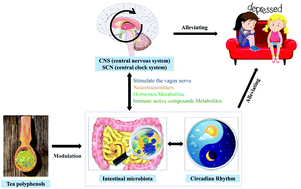Depression is a prevalent neuropsychiatric disease with a high recurrence rate, affecting over 350 million people worldwide. Intestinal flora disorders and gut-brain-axis (GBA) dysfunction may cause mental disorders. Alterations in the intestinal flora composition could increase the permeability of the gut barrier, activate systemic inflammation and immune responses, regulate the release and efficacy of monoamine neurotransmitters, alter the activity and function of the hypothalamic–pituitary–adrenal (HPA) axis, and modify the abundance of the brain-derived neurotrophic factor (BDNF); all of these showed a close correlation with the occurrence of depression. In addition, the disturbance of the intestinal flora is related to circadian rhythm disorders, which aggravate the symptoms of depression. Tea polyphenols (TPs) have been found to have antidepressant effects. Therefore, the close reciprocity between the intestinal flora and circadian rhythm provides a new opportunity for TPs to regulate depression relying on the intestinal flora. In this review, we discussed the relationship between intestinal flora dysbiosis and the pathogenesis of depression and the mechanism of TPs relieving depression via the GBA.

